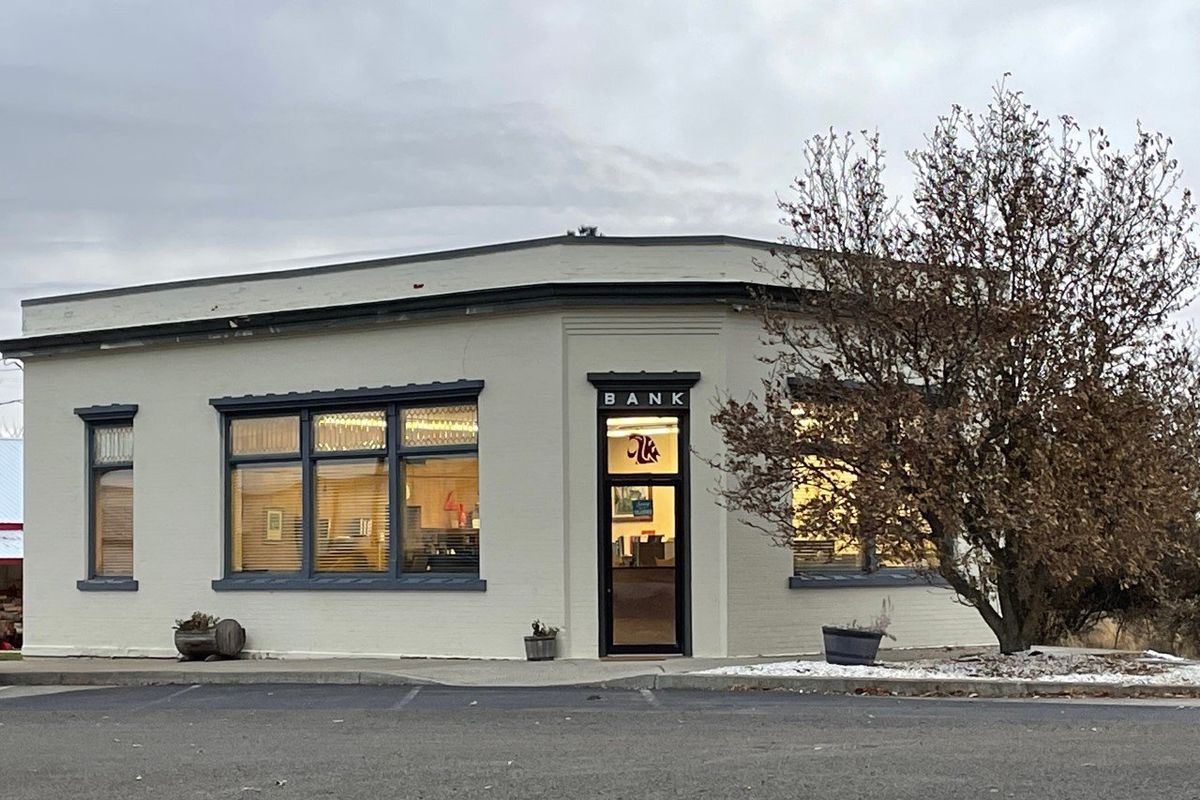Crypto firm FTX’s ownership of a U.S. bank in a small Eastern Washington town raises questions

FARMINGTON, Wash. – Among the many surprising assets uncovered in the bankruptcy of the cryptocurrency exchange FTX is a relatively tiny one that could raise big concerns: a stake in one of the country’s smallest banks.
The bank, Farmington State Bank is an hour’s drive south of Spokane in Whitman County near the Idaho border. It has five employees in Farmington. But it has about 25 employees working remotely for Farmington State Bank and Moonstone Bank, said Josey Booth, director of business operations at Moonstone Bank and Farmington State Bank.
Moonstone Bank is a new digital banking division of Farmington State Bank that has not yet opened to the public, Booth said.
Farmington State Bank, which has operated out of the same building since 1911, does not offer online banking or even a credit card.
It’s unclear how FTX was allowed to buy a stake in a U.S.-licensed bank, which would need to be approved by federal regulators.
The tiny bank’s connection to the collapse of FTX is raising new questions about the exchange and its operations. Among them: How closely tied is FTX, which was based in the Bahamas, to the broader financial system? What else might regulators have missed? And in the hunt for FTX’s missing assets, how will Farmington get dragged into the multibillion-dollar bankruptcy?
The links between FTX and Farmington State Bank, which was founded in 1887 by a cooperative of farmers and ranchers, began in March when Alameda Research, a small trading firm and sister to FTX, invested $11.5 million in the bank’s parent company, FBH.
At the time, Farmington State Bank was the nation’s 26th-smallest bank out of 4,800. Its net worth was $5.7 million, according to the Federal Deposit Insurance Corp. The net worth of FBH was unclear Friday.
Booth said in an interview Friday inside the bank that the $11.5 million investment seems large but it was less than 10% of FBH’s value.
“(It was a) very, very small stake in the company,” he said.
Joni Denton, a teller at Farmington State Bank, said at least part of the investment was in Moonstone Bank to help get it off the ground.
FTX’s investment, which according to financial regulators was more than double the bank’s net worth, was led by Ramnik Arora, a top lieutenant of the exchange’s founder, Sam Bankman-Fried. Arora was responsible for many of the much larger deals that FTX signed with Sequoia Capital and other venture capitalists that eventually failed.
Farmington has more than one crypto connection. FBH bought the bank in 2020. The chair of FBH is Jean Chalopin, who, along with being a co-creator of cartoon cop Inspector Gadget in the 1980s, is the chair of Deltec Bank, also based in the Bahamas. Deltec’s best-known client is Tether, a crypto company with $65 billion in assets offering a stablecoin that is pegged to the dollar.
Tether has long faced concerns about its finances, in part because of its reclusive owners and offshore bank accounts. Through Alameda, FTX was one of Tether’s largest trading partners, raising concerns that the stablecoin could have yet-undiscovered ties to FTX’s fraudulent operations.
Deltec did not return a request for comment to the New York Times.
Before the acquisition, Farmington’s deposits had been steady at about $10 million for a decade. But in the third quarter this year, the bank’s deposits jumped nearly 600% to $84 million. Nearly all of that increase, $71 million, came from just four new accounts, according to FDIC data.
Booth said he could not share information about the depositors.
Online, Farmington State Bank now goes by Moonstone Bank. The name was trademarked a few days before FTX’s investment. Moonstone’s website doesn’t say anything about bitcoin or other digital currencies. It says Moonstone wants to support “the evolution of next generation finance.”
Chris Barfuss, a Farmington resident, said he is not worried about his money in Farmington State Bank. If an issue arises, he said he can simply withdraw his money.
Booth said Farmington State Bank customers’ money is safe because the bank is FDIC-insured.
“My only concern is to make sure that everyone knows and recognizes that their money is safe,” Booth said. “This bank has every intention to be around for another 135 years-plus.”
The bank has been owned by mostly individual shareholders the last three decades, he said.
“Honestly, our current ownership has more genuine concern for this community” than past owners in the last 30 years, Booth said.
But banking veterans say it’s hard to believe that regulators would have knowingly allowed FTX to gain control of a U.S. bank.
“The fact that an offshore hedge fund that was basically a crypto firm was buying a stake in a tiny bank for multiples of its stated book value should have raised massive red flags for the FDIC, state regulators and the Federal Reserve,” said Camden Fine, a bank industry consultant who used to head the Independent Community Bankers of America. “It’s just astonishing that all of this got approved.”